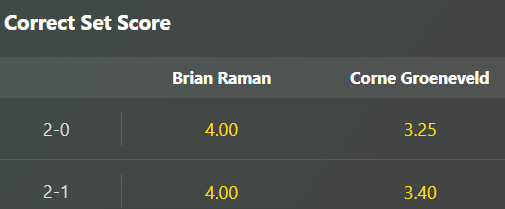Darts was once nothing more than a pub pastime in the UK – a casual game to enjoy while having a pint with your friends. But it has now evolved into a fully-fledged sport. Today, the world’s best players compete in front of thousands in the stands and millions watching on TV.
Since the game has become so big, darts betting can add to the thrill of enjoying darts to a significant level. Below, we’ll provide an overview of the main darts betting markets and share a few tips to boost your betting strategy.
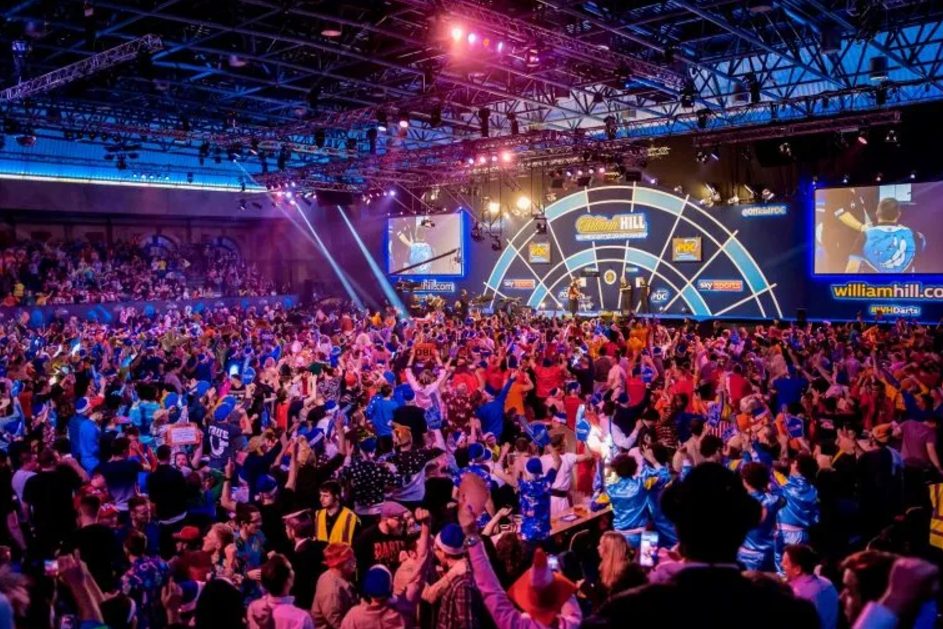
First, let’s go over the common betting markets for darts:
Match Result
The Match Result market in darts is one of the most straightforward betting options. It involves predicting the outcome of a match, typically by selecting which player will win. The bet can be placed on one of two possible outcomes:
- Player 1 to win
- Player 2 to win
Example:
 The screenshot from bookmaker bet365 above shows the Match Result market for the match between Brian Raman and Corne Groeneveld. Groeneveld is the slight favourite in this tie, while Raman will be the underdog by a small margin.
The screenshot from bookmaker bet365 above shows the Match Result market for the match between Brian Raman and Corne Groeneveld. Groeneveld is the slight favourite in this tie, while Raman will be the underdog by a small margin.
Brian Raman (2.10): If you bet £10 on Brian Raman to win, you would potentially win £21 (including your initial £10 stake).
Corne Groeneveld (1.72): If you bet £10 on Corne Groeneveld to win, you would potentially win £17.20.
Correct Score
This is another common darts betting market. In this case, you need to predict the precise score of the match. Simply predicting the winner doesn’t satisfy this wager, neither does predicting the winning margin. You must predict the final score to claim your winnings.
Example:
Let’s revisit the Brian Raman vs. Corne Groeneveld match. This time we will look at a different market for the match at bookmaker bet365. The screenshot above shows the Correct Score odds for Raman vs. Groeneveld. Let’s break down the odds:
2-0 (Brian Raman 4.00, Corne Groeneveld 3.25):
This means you’re betting on Brian Raman to win the match 2 sets to 0. If you bet £10 on this outcome and it happens, you’d win £40 (your original £10 stake plus £30 profit). Similarly, if you bet £10 on Corne Groeneveld to win 2-0, you’d win £32.50.
2-1 (Brian Raman 4.00, Corne Groeneveld 3.40):
This means you’re betting on the match to go to three sets, with Brian Raman winning 2-1. The odds and potential returns work the same way as the 2-0 scenario.
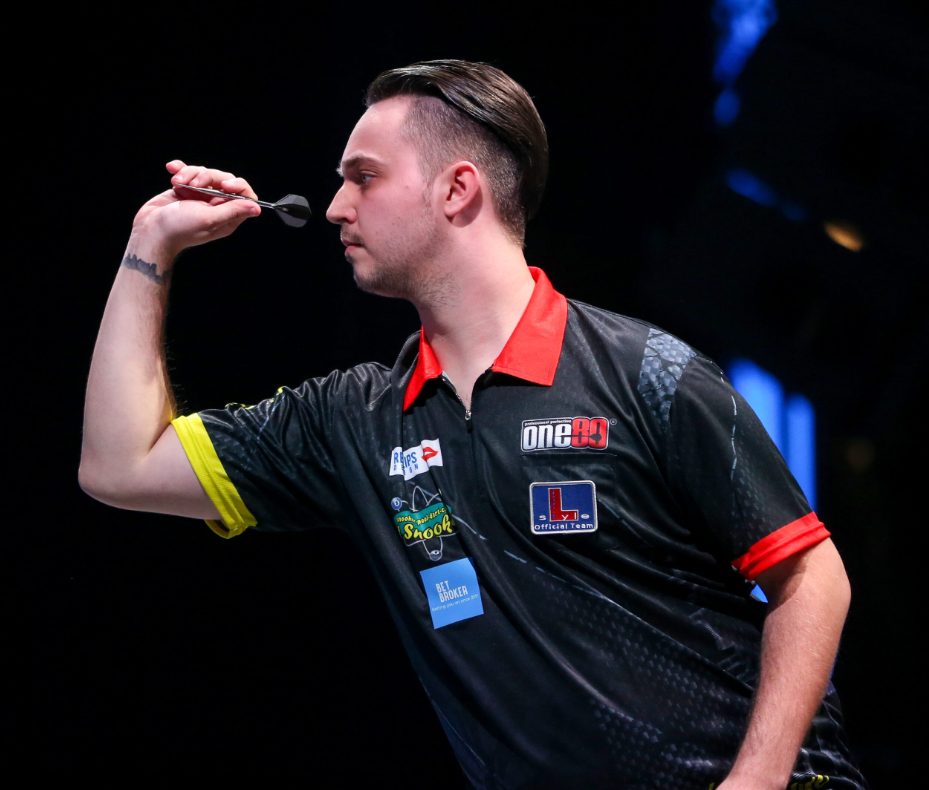
Handicap
Handicap bets ask punters to predict the performance of a player in the match with a slight margin of error. In this case, you need to predict the maximum losing margin of a player, or the minimum winning margin of a player.
Example:
We analysed the handicap odds for the Brian Raman vs. Corne Groeneveld, as seen on bet365, below:
Brian Raman (+1.5) 1.33
This means Brian Raman is given a 1.5 set advantage. If you bet £10 on Brian Raman, he would need to lose by less than 1.5 sets for you to win your bet. For example, if the final score is 2-1 to Corne Groeneveld, Brian Raman would have won the bet because he lost by less than 1.5 sets.
If you win this bet with a £10 stake, you’d receive a total payout of £13.30 (£10 stake + £3.30 profit).
Corne Groeneveld (-1.5) 3.25
This means Corne Groeneveld is given a 1.5 set disadvantage. If you bet £10 on Corne Groeneveld, he would need to win by more than 1.5 sets for you to win your bet. For example, if the final score is 3-0 to Corne Groeneveld, he would have won the bet because he won by three sets.
If you win this bet with a £10 stake, you’d receive a total payout of £32.50 (£10 stake + £22.50 profit).
Tournament Winner
The Tournament Winner is another simple betting market, but it is a more long term investment. Instead of betting on single matches, you predict which player will take the tournament home. In most cases, you will have to make the assumption before the tournament starts. It can be riskier, but it often offers better returns, and most punters favour it.
Example:
 For explaining this market, we have turned to bookmaker William Hill. Here are the odds we found on the site for the potential PDC World Darts Championship champion:
For explaining this market, we have turned to bookmaker William Hill. Here are the odds we found on the site for the potential PDC World Darts Championship champion:
- Luke Littler (3.00): The favourite to win the tournament with odds of 3.00. A successful £10 bet on Littler would result in a £30 payout, with the stake included.
- Luke Humphries (4.00): Close behind Littler, with odds of 4.00. A £10 bet on Humphries would return £40, plus the stake, if he wins the championship.
- Gary Anderson (10.00): A more experienced player with odds of 10.00. A £10 bet on Anderson would return £100 (including the stake) if he wins. Though not the favourite, Anderson is a former World Champion and a formidable opponent, making him a solid choice for bettors looking for value.
- Michael van Gerwen (12.00): With odds of 12.00, Van Gerwen is considered a strong but slightly less likely contender. A £10 bet on the Dutchman could bring in a sweet £120 payday. As one of the best players in darts history, he remains a popular pick despite having a somewhat lower chance this time around.
- Mike De Decker (26.00): A more speculative bet, with odds of 26.00. A £10 wager on De Decker would bring in £260 in profits if he pulls off a surprise victory.
- Michael Smith (29.00): An outsider in the tournament with odds of 29.00. A £10 bet on Smith would yield £290 in total, if he wins. Although he’s a respected player, the odds suggest he’s far less likely to win compared to the favourites.
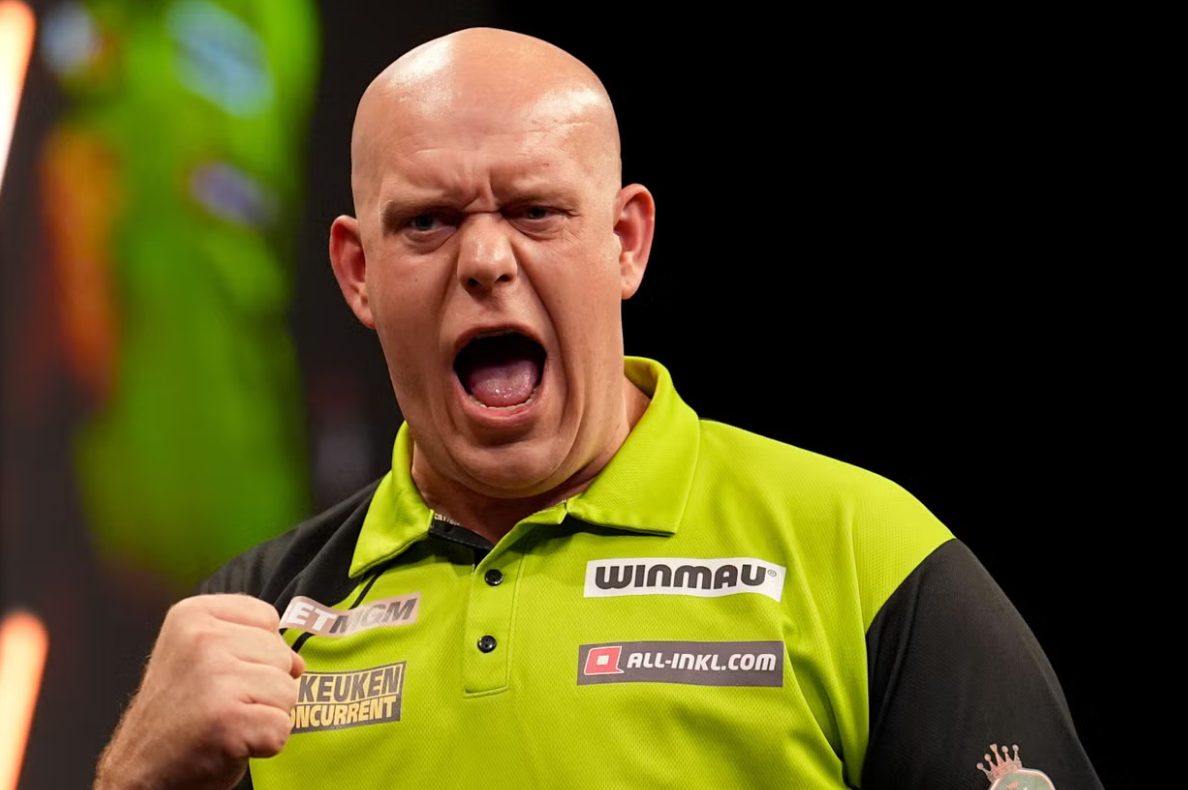
Prop Bets
Prop bets, or proposition bets, in darts are wagers on specific events within a match or a tournament, rather than the overall outcome. These bets add excitement and provide a wider range of betting opportunities for fans.
Here are some common types of prop bets in darts:
- 180s: Betting on the total number of 180s (perfect scores) a player or both players will hit in a match.
- Checkouts: Betting on the number of high checkouts (e.g. 140+) a player will achieve.
- First 180: Betting on which player will hit the first 180 of the match.
- Highest Checkout: Betting on the highest checkout achieved in the match.
- Nationality of the Winner: Predicts the nationality of the winner of the tournament.
- Nine-Dart Finish: Betting on whether a specific player or either player will achieve a perfect nine-dart finish (the lowest possible number of darts to finish a leg).
- Player Performance: Betting on specific player performances, such as the number of legs won or the total number of points scored.
Prop bets can be more volatile and unpredictable than traditional match bets, but they also offer the potential for higher payouts.
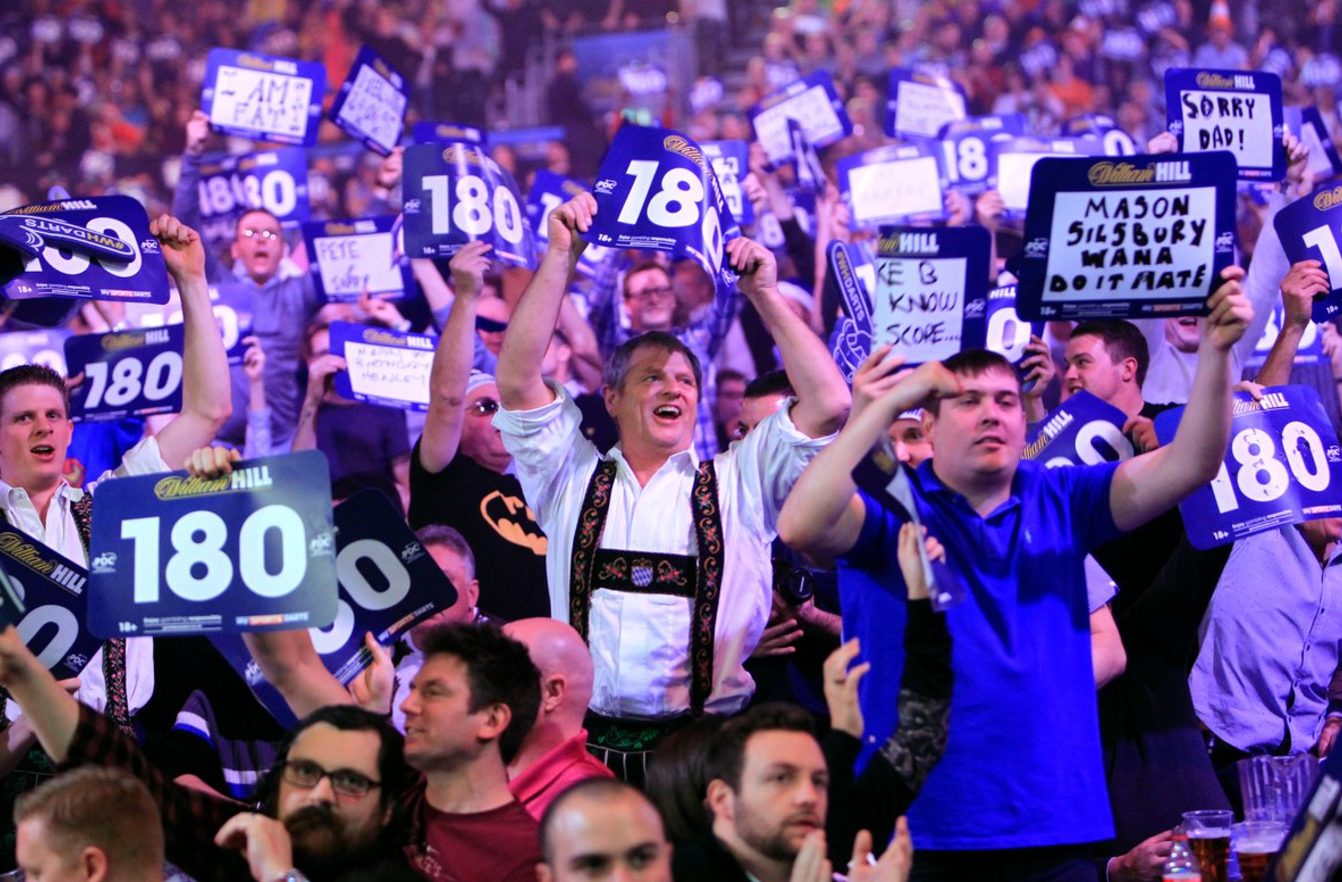
How to Bet on Darts: Special Tips
Study Competition History
Some players love to play in certain competitions and playing conditions. The exact opposite is also true. Legends like Dave Chisnall and Mervyn King never managed to play their best games in majors. So, make sure to consider tournament history, when you are about to bet on a potential tournament winner.
Learn From Your Previous Bets
You should track your betting history, as keeping a diary helps you assess and improve your darts strategy. Start with a basic notebook—no need for anything fancy initially. Over time, your diary will evolve and become an invaluable resource for your betting journey. Additionally, consider storing a digital copy on your mobile or backing it up in the cloud for safekeeping.
Bet on Underdogs in Short Format Matches
Most major dart competitions are played in a five-legs-per-set format, but the World Masters runs on a three-legs-per-set format. Longer formats, such as best-of-11 or best-of-13 sets, favour more consistent players who can maintain their focus over extended periods.
Shorter formats, like best-of-five sets, can be more unpredictable and favour players who can perform well under pressure in shorter bursts.
Don’t Let Hype Cloud Your Judgement
Popular opinion can often be deceptive. While many players are touted as favourites, not all of them live up to the expectations. Don’t just follow the hype—take the time to review each player’s stats and head-to-head records before placing your bets.
Go for Handicaps if a Match is Too Close to Call (Or the Opposite)
If one player is heavily favored, the odds for them to win outright might be low, offering limited potential returns. Handicap betting minimises the risk and gives you better odds on the favourite to win by a certain margin.
Alternatively, If you believe a match will be close, but you’re not confident enough to pick an outright winner, betting on a spread can be a good option. You can bet on the underdog to cover the handicap or the favourite to win by more than the handicap.


